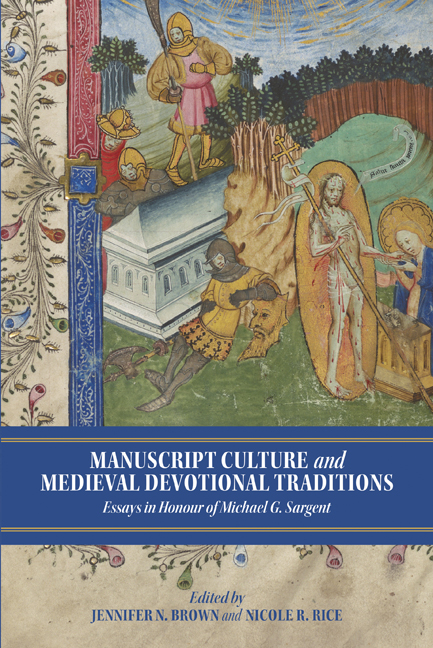Book contents
- Frontmatter
- Dedication
- Contntes
- List of Illustrations
- Acknowledgements
- List of Abbreviations
- Michael Sargent: An Appreciation
- I Manuscript Transmission and Textual Adaptation
- II Translated Texts and Devotional Implications
- III Rhetorical Strategies and Spiritual Transformations
- IV Texts and Contours of Religious Life
- Bibliography
- List of Contributors
- Michael G. Sargent’s Publications
- Index
- Tabula Gratulatoria
- York Manuscript and Early Print Studies
4 - Cargo in the Arbor: On the Metaphysics of Books and Scholarly Editions
Published online by Cambridge University Press: 24 March 2021
- Frontmatter
- Dedication
- Contntes
- List of Illustrations
- Acknowledgements
- List of Abbreviations
- Michael Sargent: An Appreciation
- I Manuscript Transmission and Textual Adaptation
- II Translated Texts and Devotional Implications
- III Rhetorical Strategies and Spiritual Transformations
- IV Texts and Contours of Religious Life
- Bibliography
- List of Contributors
- Michael G. Sargent’s Publications
- Index
- Tabula Gratulatoria
- York Manuscript and Early Print Studies
Summary
A proposition which emanates from myself – whether cited variously as my eulogy or as blame – I claim it as my own together with all those that crowd in here – affirms, in short, that everything in the world exists in order to end up as a book. (Stéphane Mallarmé)
Commentary on a text which does not exist
Of course it would be in the Campo de’ Fiori that I should find at last a copy of a text I had long sought. The sellers of chemically produced truffle oils, dubious balsamic vinegars and other fake delicacies were packing up while the last of the old nonnas boxed unsold vegetables into the precarious moto-vans in which they’d brought them from their dusty farms or allotments outside the city. Rome's street sweepers are bested only by their Neapolitan confreres in indifference to the actual business of cleaning, so the trash of the morning market fluttered around the legs of stalls in the process of being disassembled, as the sweepers stood gossiping listlessly or chewing on slices of pizza bianca from the Forno in the corner of the square. Tourists wandered off, doubting their overpriced purchases, or discovered the square for the first time, staring in knowledge or ignorance at the forbidding statue of Giordano Bruno, who dreamed of an object of radiant textuality – a certain circular Book, whose circumference is everywhere and centre, nowhere – and who perhaps, at last, had sighted it, as he was burned to death here by the Roman Inquisition on Ash Wednesday 1600. With a bar through his tongue, his vision of a universe turned upside down was at last substantiated.
In one corner of the piazza, appropriately, there is a bookshop called Fahrenheit 451. Like most of Rome's booksellers, the proprietor gives the impression that his customers are an inconvenience, and doubtless they are, here in Campo de’ Fiori, where tourists occasionally wander accidentally into the shop and leave, bemused, because all the books are, inevitably, in Italian. But bookshops are sacred, regardless of language, and so I found myself browsing the tables in the pleasingly gloomy front room, before scanning the shelves in a narrow corridor leading into further, gloomier rooms at the rear of the shop.
- Type
- Chapter
- Information
- Manuscript Culture and Medieval Devotional TraditionsEssays in Honour of Michael G. Sargent, pp. 84 - 106Publisher: Boydell & BrewerPrint publication year: 2021



